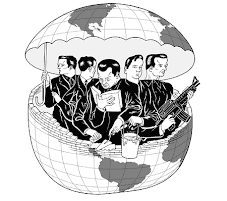Lehman demise ripples across Asia financial system
HONG KONG (AP) — The Bank of Japan injected 2.5 trillion yen, or $24 billion, into money markets Tuesday as regulators across Asia moved to bolster their financial systems after the collapse of U.S. investment house Lehman Brothers.
From Tokyo to Hong Kong and Seoul, operations of Lehman's local units were suspended and governments sought to reassure investors that the toll on regional companies exposed to the bank would be limited.
"The Bank of Japan will carefully monitor recent situations surrounding the U.S. financial institutions and their influences, and will continue to strive to ensure smooth settlement of funds and maintain stability in financial markets through measures such as appropriate money market operations," Gov. Masaaki Shirakawa said as the institution pumped 2.5 trillion yen into money markets through two separate injections.
Cabinet ministers, along with the central bank chief, were also to hold an emergency financial meeting.
South Korea's central bank, meanwhile, said it was intensifying its monitoring of financial and foreign exchange markets. The Bank of Korea would provide extra foreign currency liquidity if needed via the swap market to "calm nerves of market participants," it said.
In China, the mainland central bank cut a key interest rate Monday for the first time in more than six years. Hong Kong's monetary chief emphasized plans in place to flush more cash into the banking system if necessary during a "severe crisis" in global markets.
As regional equities plunged Tuesday, Taiwan directed its state-owned banks and major funds to buy shares in an effort to stem heavy losses in the country's market.
Reeling from $60 billion in toxic real-estate debt, Lehman Brothers Holdings Inc. filed for Chapter 11 bankruptcy in New York on Monday. The storied, 158-year-old Wall Street firm — once America's fourth-largest investment bank — was unable to secure an investment partner despite a flurry of last-minute negotiations over the weekend.
Investors were also shaken by news Monday that Merrill Lynch sold itself to Bank of America Corp. for about $50 billion.
In Tokyo, the Japanese unit of Lehman Brothers requested bankruptcy protection. Regulators in South Korea, Hong Kong and Australia restricted or stopped altogether the operations and trading activities of local Lehman businesses.
As governments appealed for calm, though, there were signs of fallout from the bankruptcy.
In China, an investment fund warned of potentially heavy losses. Hua An Fund Management Co., one of a number of funds operating foreign investment funds under China's "qualified domestic institutional investor," or QDII, program, did not say how much might be at risk.
In Taiwan, the regulatory watchdog revealed that the country's institutional and retail investors held about 80 billion New Taiwan dollars ($2.5 billion) worth of exposure to Lehman investments.
Several Japanese lenders — Aozora Bank Ltd., Chuo Mitsui Trust Holdings, Inc. and Chiba Bank among them — said their actual exposure to Lehman would be little changed from their earlier projections or even smaller.
"So far, we haven't confirmed any signs that Japanese financial institutions are seriously affected," said Japanese Financial Services Minister Toshimitsu Motegi.
South Korea's financial institutions had a total of $720 million exposure to Lehman Brothers, but the amount was likely to have a minimal effect on their financial soundness, the country's financial regulator said.
In Australia, Prime Minister Kevin Rudd described Australian banks' exposure to the Lehman bankruptcy as "modest."
Among the country's financials, Australia and New Zealand Banking Group Ltd. said it had around $120 million exposure to Lehman. Commonwealth Bank of Australia Ltd. divulged about $122 million on its books.
"We are facing one of the most difficult times in international financial markets," Australia Treasurer Wayne Swan told Parliament on Tuesday.
"We don't face the same problems being experienced in the United States," he added. "But nevertheless, events on international markets are having an impact on confidence around the world."
AP writers Mari Yamaguchi in Tokyo, Kelly Olsen in Seoul, South Korea, Rohan Sullivan in Sydney, Australia, Rod McGuirk in Canberra, Australia, and Elaine Kurtenbach in Shanghai, China, contributed to this report.
http://ap.google.com/article/ALeqM5gsB5UW4UDCEstS1X_K5LuptgLnSwD937N32O0



No comments:
Post a Comment